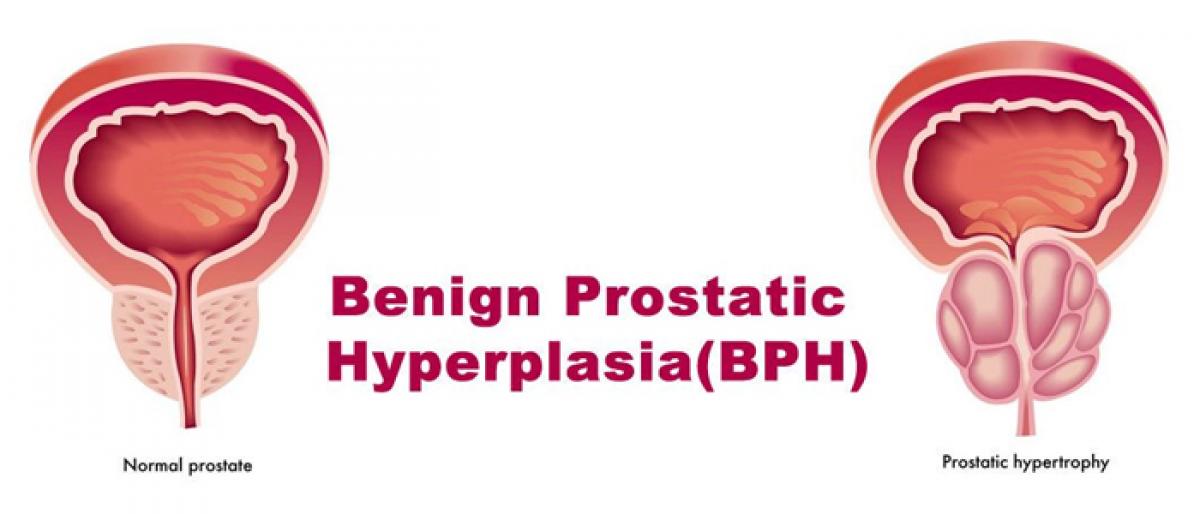What is leaving men embarrassed & putting their health at stake

As men get older, their body changes in ways one cant always control For most men, one of those changes come with the growing prostate
Shedding light on Prostate Health and lack of awareness in the community
Vijayawada: As men get older, their body changes in ways one can’t always control. For most men, one of those changes come with the growing prostate.
Aging men tend to have larger prostates than younger men. Enlargement of the prostate that is not a result of cancer is called Benign Prostatic Hyperplasia (BPH).
Incidence of BPH, one of the most common conditions affecting adult men, increases dramatically after the age of 50!BPH also called prostate gland enlargement — is a common condition as men get older.
Prostatitis and benign prostatic hyperplasia (BPH) arecommon prostatic diseases; that affects millions of men worldwide.But it is important to note here that BPH isn’t prostate cancer and doesn’t make you more likely to get it.
The size of your prostate doesn't necessarily determine the severity of your symptoms.
Some men with only slightly enlarged prostates can have significant symptoms, while other men with much enlarged prostates can have only minor urinary symptoms.
In some men, symptoms eventually stabilize and might even improve over time.
According to Dr Krishna Kishore, Consultant Urologist, KK Hospital “An enlarged Prostate directly affects a man’s ability to urinate as there is increased pressure on the bladder or the bladder becomes more irritable – this makes the urge to urinate stronger.
Additionally, the bladder cannot empty itself as efficiently, meaning that it is not long after going to the toilet that you find yourself having to go again”.
In general, the prevalence of BPH increases with increasing age, with the highest prevalence in participants aged 70 and above.
According to a study conducted on 1997, India’s prevalence by age is 25 per cent for 40–49; 37 per cent for 50–59; 37 per cent for 60–69; 50 per cent for 70–79. With aging, prostatic diseases occur simultaneously which is an important factor in the deterioration of the quality of life of men.
Consider the importance of good sleep that has only begun to be understood.
It has been known for many years that a good night’s sleep is important, with 7–8 hours endorsed for adults.
Disturbed sleep can mean many things but it is often equated with insomnia, which is clinically defined as persistent difficulty in initiating or maintaining sleep, or non-restorative sleep, that causes
significant daytime distress and impaired social or occupational functioning.
Prostatitis and BPH are representative diseases that develop in the prostate; they are closely associated with the male, and they exert significant effects on quality of life.
In addition, deterioration of quality of life caused by prostate diseases may be affected not only by the prostate diseases themselves but also by the sexual dysfunction caused by the prostate diseases secondarily.
Furthermore, sexual dysfunction may develop as a side effect after treatment of prostate disease; thus, consideration of these points at the time of treatment of prostate disease is required.
Therefore, therapies suitable to each condition should be selected with an understanding of the close association of prostate diseases and associated sexual dysfunction with the quality of life of males.
According to Dr Krishna Kishore, Consultant Urologist, KK Hospita “Many men will develop an enlarged prostate as they age, because the gland does not stop growing throughout their life time.
As men age they should get regular prostate screenings to check for BPH/Prostate cancer.If you're having urinary problems, discuss them with your doctor.
Even if you don't find urinary symptoms bothersome, it's important to identify or rule out any underlying causes. Untreated, urinary problems might lead to obstruction of the urinary tract.
It is critical to consult your doctor and it is important to avoid shying away from the issue. Your doctor can help you choose the best care based on your age, health, and how the condition affects you”.
There is a need to introduce Targeted screening or Smart screening in India to diagnose prostate cancer in early stage and cure the disease.
All patients attending Urology oPds for urinary complaints should undergo yearly PSA and Digital rectal examination after 50 years and 40 years with family history of prostate cancer.







